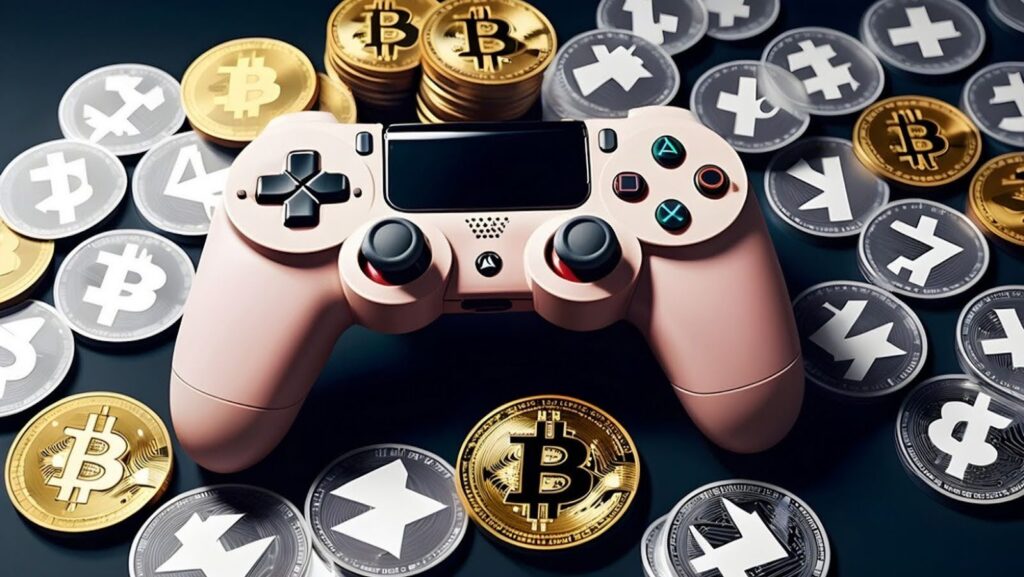
Technologies are rapidly evolving in today’s digital world. Sometimes, their application in various industries leads to revolutionary progress, as has happened with the advent of blockchain technology. The combination of cryptocurrencies and non-fungible tokens (NFTs) based on blockchain is revolutionizing the gaming industry by changing the rules in game development, such as ways of creation, playing, and monetization.
For example, we can see the evolution of online gambling games based on Bitcoin casinos, which provide new methods of payment and players rewards by using Bitcoin or other cryptocurrencies in casino games. Also, most gamers like to buy virtual things for real money in game worlds, and the NFTs are the best decision in this way because their price could increase in future.
What do we know about cryptocurrencies and NFTs’ influence on the gaming sector? How does it impact game development, virtual economies, revenue generation, and the emergence of Bitcoin gambling establishments? This article tries to answer these questions, so keep reading if you want to learn more.
Blockchain in the Game Dev Industry: What’s the Impact?
In fact, Blockchain technology has revolutionized the video game development industry. Its decentralized platform for game production, distribution, and revenue gives huge opportunities for game creation and future gamification not only in the gaming sphere but also in other spheres, such as mobile banking, digital marketing, investment, and others.
Game developers can use blockchain for including in their products unique features like player-owned assets, provably fair gameplay, and secure in-game transactions. Also, thanks to blockchain, game creators can implement in virtual worlds decentralized gaming systems without middlemen and granting players increased autonomy in their gaming experience.
Cryptocurrency’s Impact on Virtual Economics in Metaverse Gaming
New metaverse gaming worlds, like Roblox or Fortnite, or connected virtual realms, allow users to engage, socialize, and conduct business and are becoming more popular as cryptocurrencies see increased adoption. For example, gamers can buy virtual items for crypto or exchange NFTs with each other in virtual worlds.
As we can see, many virtual economies employ Bitcoin as their principal currency, making it easier to swap assets, in-game cash, and digital goods/items across numerous gaming platforms. This smooth interoperability enables users to move assets between games, resulting in a unified gameplay experience throughout the metaverse.
How Cryptocurrencies and NFTs Сontribute Monetization in Gaming Worlds
Non-fungible tokens, or NFTs, are an effective method of monetizing gameplay and providing players with true ownership of digital goods or some unique items in games. NFTs are distinct, indivisible assets that may be traded, bought, and sold on blockchain-enabled markets.
NFTs are commonly used in the gaming industry to depict characters, in-game goods, skins, and even whole-game worlds. This enables players to invest in valuable digital goods and monetize their gaming successes.
What are The Benefits of Using Cryptocurrency as a Payment Method at Bitcoin casinos?
Bitcoin casinos are transforming the online gaming business by allowing players to wager using bitcoins. These casinos use blockchain to provide transparent games, quick transactions, and enhanced security and privacy measures, helping to digitalize and gamify gambling.
Note the main benefits of using Bitcoin as a payment method in online casinos:
- High level of security and safety of private data: Bitcoin transactions are convenient for players because they increase anonymity and safety compared to traditional payment methods, as they are decentralized and pseudonymous. By accepting Bitcoin as a form of payment, online gaming companies increase their security from fraud and identity theft, protecting the financial and personal data of their players.
- Everybody can use Bitcoin from everywhere: Thanks to its decentralized nature, Bitcoin can be used by everyone from every country in the world. By accepting Bitcoin as a form of payment, online gaming platforms can attract players worldwide who do not use traditional banking services or prefer to use cryptocurrencies for transactions.
- Prompt transactions: Due to Bitcoin’s rapid processing speed, players can quickly deposit money and start gaming without delay. This instantaneous transaction speed, in addition to improving user experience, eliminates the waiting period associated with more traditional payment options such as credit card or bank transfer.
- Reduced transaction fees: Compared to traditional payment methods, Bitcoin transactions usually offer lower transaction fees, especially for cross-border transfers. If companies like Bitcoin casinos or others use BTC as a payment, they could offer players reduced fees or increased rewards and bonuses in crypto.
- The decentralized structure: The Bitcoin network is distributed, so it does not depend in most cases on local laws, centralized authorities, and financial institutions. Online gambling websites, which use BTC or other cryptocurrencies for transactions, adopt decentralization and give their players increased financial independence, anonymity and authority over their funds. Thanks to the decentralized structure of blockchain gaming communities can be autonomous and free from reliance on conventional banks and may feel sure that their money is safe.
The ability to pay with Bitcoin and other cryptocurrencies attracts players from all over the world who seek decentralized, international, and censorship-resistant gaming experiences.
In Summary
When the video game industry matures, NFTs and cryptocurrencies should drive additional growth and development. So, as we see, both virtual economies, game development, gameplay monetization, and the future of online gambling in the gaming industry are all being impacted by bitcoin and NFTs.
In the future using these technologies will increase, so investors, gamers, and game designers can seize new opportunities and engage in the thrilling growth of video games in the digital age.










